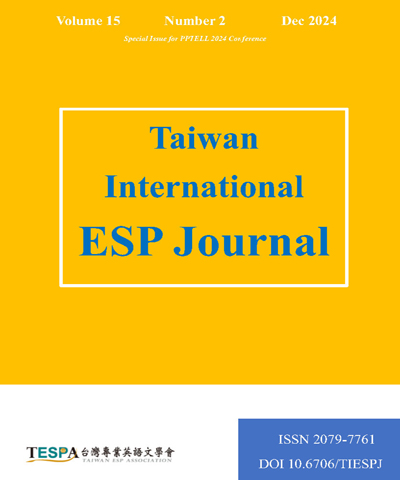
Taiwan International ESP Journal/台灣專業英語文期刊
- OpenAccess
台灣專業英語文學會,正常發行
選擇卷期
- 期刊
- OpenAccess
The Ministry of Education in Taiwan has developed new curriculum guidelines which include an emphasis on overall competency and subject integration. Taiwan's educators are also involved in planning to make Taiwan bilingual by 2030, with English as a second official language. English, traditionally taught with a focus on linguistic elements, is now viewed instead as a tool to acquire content-area knowledge. Teachers are actively exploring the best approaches to face the challenges of interdisciplinary cooperation and developing students' bilingual skills. The purpose of this qualitative study was to assess the effectiveness of science-English classes that were part of 5-day science camps designed for elementary or junior high school students and were taught by pre-service English teachers. Two English professors adopted a CLIL approach as they worked with eight pre-service English teachers as well as a chemistry professor and his students to develop four units on science content for the camps. Scaffolding for both the instructors and the students was incorporated at various stages of the preparation and implementation of the science-English classes. At the conclusion of the camps, 24 in-service science teachers who participated in the camps with their students were asked to answer open-ended questions on their impressions of attending the four science-English lessons. Results showed that the in-service science teachers felt the science classes taught by the pre-service English teachers effectively engaged the students and led them to become more comfortable using English in content courses. Suggestions for how the lessons could be modified to provide additional assistance to learners were also offered. These in-service science teachers also expressed an interest in developing interdisciplinary programs in their own schools if enough support could be provided. The results indicate that in-service subject teachers should be encouraged to play a greater role in teacher training and professional development courses focused on interdisciplinary cooperation.
- 期刊
- OpenAccess
The development of learning materials seems to be a fact of life for many ESP teachers. Even though there are many empirically grounded studies on the development of English language learning materials, only a few deal with ESP materials development that would provide potential authors with instructions on how to proceed with their design. Therefore, the need arises to conduct research that would focus on both the design of a coursebook and the production of design principles. Design-based research methodology offers a solution to this problem since it involves systematic implementation, evaluation, and development of an educational intervention (in this case an ESP coursebook) with the aim of producing design principles and empirically grounded theories. This study focuses on the formulation of design principles for an ESP coursebook derived from the results of design-based research of the coursebook, English for Information Technology, designed for the course, English for IT, that is attended by students of the Faculty of Information Technology at Brno University of Technology in the Czech Republic. The research was conducted among 184 students and 13 teachers at Brno University of Technology in two iterative cycles from 2018 to 2020. The research methods included the coursebook evaluation by means of a questionnaire survey and testing students' knowledge and skills before and after using the coursebook. The research results indicated the requirements for the coursebook redesign so that it could meet the needs of the target group of students as well as teachers' and students' common and different preferences in choosing the suitable ESP learning materials. Besides validation of English learning materials development theories and theories of second language acquisition, the design-based research of the coursebook contributed to the development of some theories of ESP coursebook design and evaluation. It is believed that the design principles presented in this study should provide a basis for adaptation to other situations, that is, they can help teachers to develop ESP coursebooks tailored for their own courses.
- 期刊
- OpenAccess
Conversational convergence is the tendency for individuals to modify their phonetic speech behaviors to converge with the behaviors of their interlocutors. Evidence of conversational convergence in a native language (L1) is robust, yet research regarding its development in the second language (L2) is sparse. In order to examine the conversational convergence in spoken dialogues, we developed a natural speech corpus in which spontaneous conversations of 15 dyads of English learners were collected and analyzed. The conversational convergence in this paper focuses on the convergence of pitch, which includes the maximum, minimum, and average pitch as well as the pitch range. A personality measure (i.e., autism-spectrum quotient score; AQ) and its correlation with the pitch measures were examined. The results reveal that in this casual board game setting, (a) an English learner tends to use higher f0 max, higher f0 min, higher f0 mean, and a narrower f0 range when speaking in their L2, and most of the pitch values (except f0 max) naturally converge; (b) personality does not directly influence language learners' pitch, but it does influence their speaking rate.

